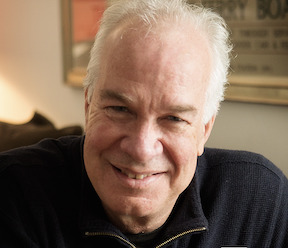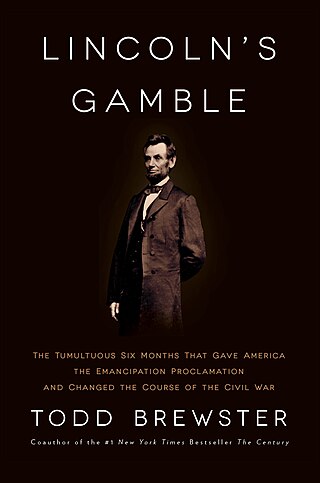The Century: America's Time is a 15-part television series of documentaries produced by ABC News about the 20th century and the rise of the United States as a superpower. The documentary originally aired on The History Channel in 1999. Peter Jennings, anchor of ABC World News Tonight narrates the series.
Along with distinguished journalist Todd Brewster, Jennings co-authored a book titled The Century which became a national bestseller. This series is part of the History Channel's "Cable in The Classroom" curriculum and the study guides for each episode can be found on their website, under the letter "C".
ABC ran a mini-marathon of the series on September 15, 2001, in reaction to the September 11 attacks. The marathon signaled the transition from 24/7 news coverage, which had gone uninterrupted since the first reports of an incident at the World Trade Center, back to "normal" programming.
| No. | Title | Original air date | |
|---|---|---|---|
| 1 | "The Beginning: Seeds Of Change" | April 12, 1999 | |
How did the 20th century change the ways Americans live? This program examines the early 1900s – when William McKinley was President, a loaf of bread cost only a few cents, horsepower really meant horsepower, flying to the moon was the stuff of dreams, and the average life span was only 45 years – while looking ahead to the decades of changes yet to come. | |||
| 2 | "1914–1919 Shell Shock" | April 12, 1999 | |
The psychological damage inflicted by the stupifying bombardments of World War I was called shell shock, a term that aptly described the feeling of the post-war world. This program illustrates America's reluctant emergence as a world power and analyzes the impact of the wholesale sense of loss – of life, of husbands and fathers, and of sacred ideals such as honor, patriotism, and glory – that sprang from "the war to end all wars." | |||
| 3 | "1920–1929 Boom To Bust" | April 13, 1999 | |
In the aftermath of World War I, many modern-minded Americans, particularly women, were eager to do away with outdated traditions and claim new rights and freedoms. This program investigates why the issue of women's rights, ranging from suffrage to smoking, became so controversial – and what that said about America's sense of self. | |||
| 4 | "1929–1936 Stormy Weather" | April 14, 1999 | |
America – a nation that claimed ever-increasing wealth as a birthright – was rudely awakened by the Great Depression, which caused 25 percent unemployment, the closing of 9,000 banks, and the loss of $2.5 billion in deposits. This program captures a people's struggle as they faced the collapse of prosperity and diminished hope of being able to experience the American Dream. | |||
| 5 | "1936–1941 Over the Edge" | April 15, 1999 | |
Safely watching Europe from across the Atlantic Ocean, many Americans observed the messianic popularity of Hitler and Mussolini and the subsequent outbreak of World War II with concern and dismay. This program explores the crucial question: could the United States resist involvement, or would American forces be sent to fight in another European war? | |||
| 6 | "1941–1945 Civilians At War (2 Parts)" | April 16, 1999 | |
World War II was the first war in history that killed more civilians than soldiers, as leaders on both sides accepted noncombatant casualties as inevitable – and, to some, even desirable. This program studies the courage and the strength necessary to face and survive starvation, bombing, torpedoing, massacre, and extermination in camps specifically designed for that purpose. | |||
| 7 | "1941–1945 Homefront" | April 19, 1999 | |
The shock of Pearl Harbor awoke America from its dream of isolationism. As troops went overseas and industry ramped up to supply the urgent need for war materials, a new wave of Southern blacks migrated north and west to fill the workforce – along with millions of women, who exchanged housework for war work. This program discusses the effects of World War II on the home front, spotlighting the war's impact as a catalyst for economic, demographic, and social change. | |||
| 8 | "1946–1952 Best Years" | April 20, 1999 | |
Demobilization after World War II meant difficult changes as the U.S., geared up for war, resumed a peacetime existence. This program describes America's new status as a superpower, as the nation shouldered the responsibility for rebuilding Europe and Japan – and for containing Soviet ambitions. The challenge faced by veterans and spouses to become reacquainted after years of separation and hardship is highlighted. | |||
| 9 | "1953–1960 Happy Days" | April 21, 1999 | |
The post-war baby boom, suburban living, Marilyn Monroe, and Elvis epitomizes the contentment of the Eisenhower years. But these were also years marked by rabid McCarthyism, violent civil rights demonstrations, and a frightening escalation in the Cold War. This program probes the tension between these crosscurrents in American history. | |||
| 10 | "1960–1964 Poisoned Dreams" | April 22, 1999 | |
Beset by both international and domestic pressures, America during the Camelot years was swiftly approaching a political-cultural meltdown. This program documents U.S. – Soviet conflicts of interest in Cuba and Vietnam and the growing polarization at home between civil rights activists and segregationist hard-liners, which resulted in the Birmingham riots and the freedom march on Washington. | |||
| 11 | "1965–1970 Unpinned" | April 23, 1999 | |
Riots and protests intensified in the U.S. as the war in Vietnam dragged on, with anti-war and civil rights activists seeking violent ways to agitate for peace and equality. This program presents the unrelenting rage that divided the nation during those perilous years, as the Watts race riots, the assassination of Martin Luther King Jr. and Robert F. Kennedy, and the Kent State killings made Headline news. | |||
| 12 | "1971–1975 Approaching the Apocalypse" | April 26, 1999 | |
The trauma of the war in Vietnam and the Watergate scandal left Americans exhausted, embittered, and disillusioned with politics and politicians. This program appraises the effects of those blights on the political landscape and their impact on the trust between the government and the governed, so vital to the well-being of a representative democracy such as the United States. | |||
| 13 | "1976–1980 Starting Over" | April 27, 1999 | |
The women's and civil rights movements, begun decades earlier and as controversial as ever, continue to evolve during the nation's Bicentennial period. This program focuses on the changing momentum of feminism, hampered by its failure to secure broad ratification of the Equal Rights Amendment, and the heated confrontations that arose over affirmative action and busing. | |||
| 14 | "1981–1989 A New World" | April 28, 1999 | |
The Reagan era witnessed the unexpected end of the Cold War and a welcome return to a booming domestic economy – but did events unfold too quickly to control? This program takes a look at the details and the aftershocks both of the dissolution of the Soviet Union and the yuppie capitalism that threatened to push the limits of the American economy too far. | |||
| 15 | "1990–1999 Then and Now" | April 29, 1999 | |
Fifty years into the future, how will computer and communications technology reshape the way Americans work and play? What will be the benefits and consequences of biotechnology? Will the third-world nations dominate headline news? This program examines key moments of the ‘90s, reflects on changes during the last five decades, and, with the assistance of leading futurists, looks ahead to some of the possible events and innovations just over the horizon. | |||

ABC World News Tonight is the flagship daily evening television news program of ABC News, the news division of the American Broadcasting Company (ABC) television network in the United States. It is currently the most watched network newscast in the United States, with an average of 2 million more than its nearest rival, NBC Nightly News. Since 2014, the program's weekday broadcasts have been anchored by David Muir. As of February 6–7, 2021, Whit Johnson and Linsey Davis anchor the Saturday and Sunday editions of the newscast respectively.

ABC News is the news division of the American television network ABC. Its flagship program is the daily evening newscast ABC World News Tonight with David Muir; other programs include morning news-talk show Good Morning America, Nightline, Primetime, 20/20, and Sunday morning political affairs program This Week with George Stephanopoulos.

Peter Charles Archibald Ewart Jennings was a Canadian-American television journalist, best known for serving as the sole anchor of ABC World News Tonight from 1983 until his death from lung cancer in 2005. Despite dropping out of high school, Jennings transformed himself into one of American television's most prominent journalists.

The Walt Disney Company has produced an anthology television series since 1954 under several titles and formats. The program's current title, The Wonderful World of Disney, was used from 1969 to 1979 and again from 1991 onward. The program moved among the Big Three television networks in its first four decades, but has aired on ABC since 1997 and Disney+ from 2020 to 2023, but is still advertised during or after the program.
Aaron Brown is an American broadcast journalist most recognized for his coverage of the September 11 attacks for CNN. He was a longtime reporter for ABC, the founding host of ABC's World News Now, weekend anchor of World News Tonight and the host of CNN's flagship evening program NewsNight with Aaron Brown. He was the anchor of the PBS documentary series Wide Angle from 2008 to 2009. He was a professor at the Walter Cronkite School of Journalism and Mass Communication at Arizona State University from 2007 to 2014.

History, formerly and commonly known as the History Channel, is an American pay television network and flagship channel owned by A&E Networks, a joint venture between Hearst Communications and The Walt Disney Company's General Entertainment Content Division.
National Geographic is an American pay television network and flagship channel owned by the National Geographic Global Networks unit of Disney Entertainment and National Geographic Partners, a joint venture between The Walt Disney Company (73%) and the National Geographic Society (27%), with the operational management handled by Disney Entertainment.

Hulu is an American subscription streaming media and content hub within the Disney+ streaming service owned by The Walt Disney Company. It was launched on October 29, 2007.

Stan Grant is an Australian journalist, writer and radio and television presenter, since the 1990s. He has written and spoken on Indigenous issues and his Aboriginal identity. He is a Wiradjuri man.
ABC News Live is an American streaming video news channel for breaking news, live events, newscasts, and longer-form reports and documentaries operated by ABC News since 2018. The channel is available through various streaming device apps such as Roku, Hulu, YouTube TV, Sling TV, Pluto TV, Xumo, FuboTV, Haystack News, Samsung TV Plus, and the news division's other streaming platforms. Centaur Communications provides the channel to Belize.

A&E Television Networks, LLC, stylized as A+E NETWORKS, is an American multinational broadcasting company that is a 50–50 joint venture between Hearst Communications and The Walt Disney Company through its Entertainment division. The company owns several non-fiction and entertainment-based television brands, including its namesake A&E network, History Channel, Lifetime, FYI, and their associated sister channels. The company also holds stakes in, or licenses, their international branches.

The Century for Young People is a non-fiction history book written by Peter Jennings and Todd Brewster. This book is an adapted version of The Century, adapted by Jennifer Armstrong. The book contains over 200 pictures to depict the 100 years of history.
Richard E. Robbins is an American filmmaker and documentary maker, who has produced and directed several documentaries for ABC and PBS. The most notable is Operation Homecoming: Writing the Wartime Experience, which puts forward the perspective of American troops returning home from service in Iraq. In January 2008, Robbins received an Academy Award nomination for the film as well as two Emmy nominations, and nominations from the International Documentary Association and the Directors Guild of America. He is also a noted producer, having produced several series for Peter Jennings Reporting, including Peter Jennings Reporting: LAPD and Peter Jennings Reporting: Dark Horizon – India, Pakistan, and the Bomb. He was a producer for the ABC special The Century: America's Time.
Kathleen Elizabeth "Bunny" Gibson is an actress and former regular dancer on the American Bandstand television program. Teen magazines referred to her as "American Bandstand's Sweetheart" and Dick Clark called her a "national symbol" receiving thousands of letters each week.

Todd Brewster is an American author, journalist, and film producer. He is presently the senior visiting lecturer in journalism at Mount Holyoke College in South Hadley, Massachusetts.

Todd Sampson is a Canadian-born Australian award-winning documentary-maker and television presenter. He appears as a co-host on the marketing discussion program Gruen and as a guest host on The Project. He wrote, produced and presented the science documentary series, Redesign My Brain which won Documentary of the Year. He is the host and producer of the ABC documentary series, Life on the Line. Sampson also writes, produces and hosts Body Hack, an adventure documentary series for Discovery International and Channel TEN which was nominated for Best Factual Series and Most Outstanding Documentary of the Year. In 2016, Sampson also acted a small part as Provost in the Oscar-nominated feature film Lion. In 2018, he won Television Personality of the Year at the GQ Men of the Year Awards. Sampson is an adventurer and has climbed to the summit of Mount Everest.

Alexander "Xand" van Hoogenhouck-Tulleken and Christoffer "Chris" van Hoogenhouck-Tulleken, known as "Dr. Chris" and "Dr. Xand' are British doctors, television presenters, and identical twin brothers. They are best known for presenting the children's series Operation Ouch!. Chris has become well known for his two-part television special for BBC One entitled The Doctor Who Gave Up Drugs. Xand has also presented shows without his brother.

Lincoln's Gamble: The Tumultuous Six Months that Gave America the Emancipation Proclamation and Changed the Course of the Civil War is a book by Todd Brewster, an American author, academic, journalist, and film producer.
Freeform is an American basic cable channel owned and operated by ABC Family Worldwide, a sub-division of the Disney Entertainment business segment and division of the Walt Disney Company. Freeform primarily broadcasts programming geared toward teenagers and young adults – with some skewing toward young women – in the 13-34 age range, a target demographic designated by the channel as "becomers". Its programming includes contemporary off-network syndicated reruns and original series, feature films, and made-for-TV original movies.
The World Is Watching is a Canadian short documentary film, directed by Peter Raymont and released in 1988. The film examines media coverage of the Nicaraguan Revolution through the lens of an ABC News crew on the ground in the country, documenting the various production pressures and limitations that can hamper the efforts of journalists to fully and accurately report a story; its thesis hinges in part on the fact that Nicaraguan president Daniel Ortega's key announcement that he would negotiate with the Contras was made only after the network's news production deadline for the day, leaving the network's initial reports on ABC World News Tonight able to report that he had made a speech but almost completely unable to say anything informative about it.